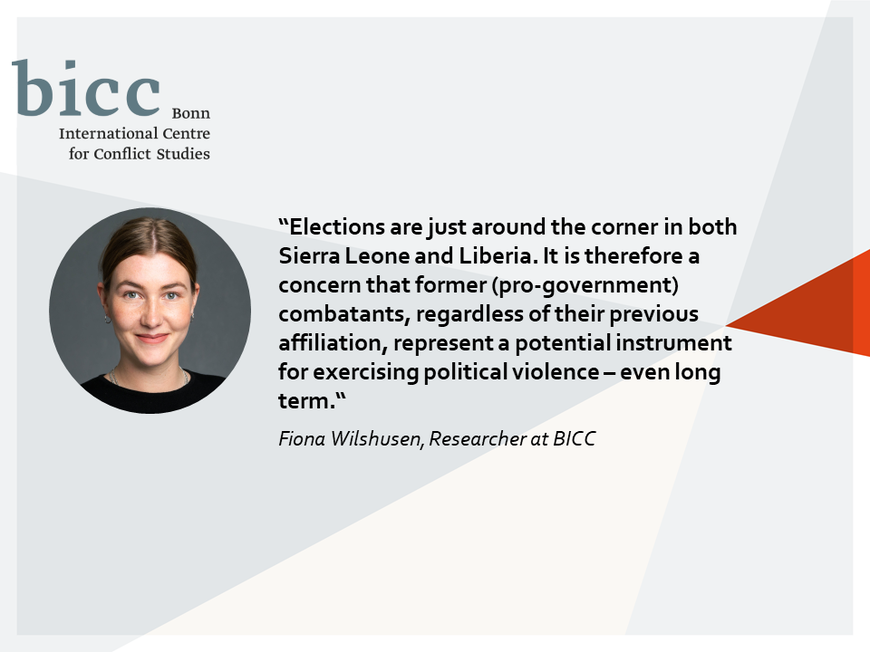Press releases
New publication \ When the 'War Attitude' persists: How Pro-Government Militias affect Society in the Long Run
More than 20 years have passed since the end of the civil wars in Sierra Leone and Liberia, violent conflicts that once involved numerous pro- and anti-government militias. However, networks of former combatants still exist in both countries. This Paper examines the long-term political and social impact of pro-government militias (PGMs).

Fiona Wilshusen, author of the SAD-Nexus-Paper 2022, points out that ex-combatants may remain a threat to peace and security long after the end of the civil wars in Liberia and Sierra Leone: 'Former (pro-government) combatants, regardless of their previous affiliation, represent a potential instrument for exercising political violence—even in the long term'. This is particularly true with elections just around the corner in both countries.
At the political level, a long-term problem emerges that has so far not been solved even by interventions such as disarmament, demobilisation and reintegration (DDR) programmes, security sector reform (SSR) or the establishment of the Special Court in Sierra Leone. Political actors willing to use violence as a political tool are likely to resort to former PGMs. By using networks of former (pro-government) combatants, the political elite in Sierra Leone and Liberia can use political violence while avoiding accountability. Fiona Wilshusen points out: 'It is striking that in both cases—and thus regardless of whether or not the Special Court has indicted the faction leaders or former warlords actively engaged in national politics—the networks of former fighters persist the closest they are to the political elite, the political parties and the government'.
Moreover, the analysis shows that networks of former combatants also affect societal relations, namely the level of trust within a society. They are often still perceived as having a ‘war attitude’ and ready to resort to violence at any time. Fiona Wilshusen concludes: 'These findings imply that the social embedding and the subsequent control of a combatant’s behaviour during fighting may also determine post-war social relations'.
As a consequence, the analysis has shown that the actual perception of former PGMs is more complex. Depending on the region and former pro-government combatants’ civil war history, they may also promote peace and security. The author notes: 'The case of Sierra Leone, where the Kamajor acted primarily as defenders of their communities of origin, highlights that the picture is not as clear-cut as perceptions and relations within the wider society may differ. In their stronghold Bo, former Kamajor are now not only respected community members but also perceived as security providers'.
Find the publication When the 'War Attitude' persists: How Pro-Government Militias affect Society in the Long Run SAD-Nexus Papers are published once a year with funding by the German Federal Ministry for Economic Cooperation and Development (BMZ).
Press release "New publication \ When the 'War Attitude' persists: How Pro-Government Militias affect Society in the Long Run" (pdf)
At the political level, a long-term problem emerges that has so far not been solved even by interventions such as disarmament, demobilisation and reintegration (DDR) programmes, security sector reform (SSR) or the establishment of the Special Court in Sierra Leone. Political actors willing to use violence as a political tool are likely to resort to former PGMs. By using networks of former (pro-government) combatants, the political elite in Sierra Leone and Liberia can use political violence while avoiding accountability. Fiona Wilshusen points out: 'It is striking that in both cases—and thus regardless of whether or not the Special Court has indicted the faction leaders or former warlords actively engaged in national politics—the networks of former fighters persist the closest they are to the political elite, the political parties and the government'.
Moreover, the analysis shows that networks of former combatants also affect societal relations, namely the level of trust within a society. They are often still perceived as having a ‘war attitude’ and ready to resort to violence at any time. Fiona Wilshusen concludes: 'These findings imply that the social embedding and the subsequent control of a combatant’s behaviour during fighting may also determine post-war social relations'.
As a consequence, the analysis has shown that the actual perception of former PGMs is more complex. Depending on the region and former pro-government combatants’ civil war history, they may also promote peace and security. The author notes: 'The case of Sierra Leone, where the Kamajor acted primarily as defenders of their communities of origin, highlights that the picture is not as clear-cut as perceptions and relations within the wider society may differ. In their stronghold Bo, former Kamajor are now not only respected community members but also perceived as security providers'.
Find the publication When the 'War Attitude' persists: How Pro-Government Militias affect Society in the Long Run SAD-Nexus Papers are published once a year with funding by the German Federal Ministry for Economic Cooperation and Development (BMZ).
Press release "New publication \ When the 'War Attitude' persists: How Pro-Government Militias affect Society in the Long Run" (pdf)


